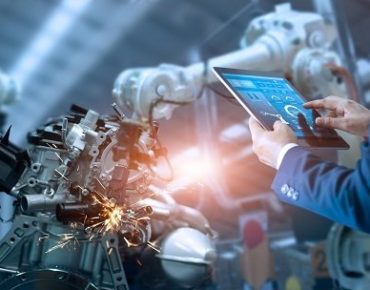AI: From Great Villain to Global Manufacturing Equalizer

via Shutterstock
When computers were introduced to businesses in the 1950s and 60s, some people looked at them in fear. “They will replace us all,” they cried. Today, the computer industry is a pillar of our economy, employing millions and propelling society forward. Ironically, some of the same people who have made billions in those industries are warning us that “we will all lose our jobs to AI and robots,” and believe that one of the main sectors under threat is manufacturing.
In the past decade, numerous European and American cities have lost millions of manufacturing jobs. The city I was born in, Monfalcone, Italy, renowned for building massive cruise ships, is one of them. However, in my city none of those jobs were lost to AI, robots or automation.
A recent study by MIT researcher David Autor sheds light on the issue. According to Autor, the US has vastly overestimated job losses from productivity growth due to automation. Rather, the real culprit is the introduction of low-cost labor countries such as China into the global trading system.
In fact, the widespread introduction of AI and robotics has the potential to change the manufacturing equation in advanced industrialized countries for the better and become the great equalizer of the global industrial landscape.
AI Manufacturing Trends
AI is poised to have massive repercussions throughout the manufacturing industry, from product consistency to quality control, in the streamlining of manufacturing supply chains and proactive equipment maintenance.
For instance, in quality control, human supervision can only do so much. Machines produce hundreds of products per hour, and humans simply cannot and do not, have the ability to spot each and every imperfection and defect. The machines are moving quickly, and humans only have the ability to focus on such a task for so long, before they become distracted or fatigued. It’s not a job easy to keep staffed.
With the introduction of AI, factories can boost product defect detection and quality assurance, increasing productivity by 50 percent or more. And today’s manufacturers are well aware of the potential of these benefits, as well as the opportunity to improve job satisfaction and retain workers.
According to IDC, 20 percent of leading manufacturers will rely on AI and other technologies by 2021. And the sooner the better – a report by McKinsey found that 50 percent of companies that embed AI in their data-intensive manufacturing processes within the next five to seven years, will have the chance to double their cash flow.
Impact on the Global Manufacturing Landscape
While the manufacturing sectors in the U.S. and EU have faced tough competition from low-cost-of-labor countries, the widespread adoption of AI and related technologies, such as robotics, can bring balance back to the equation. When productivity is not only linked to costly human labor but also to software, then the delta in production costs between US/EU and the rest of the world decreases because AI software will augment the productivity of workers irrespective of where they are.
As implementation of AI technology in manufacturing grows, manufacturers will inevitably move their plants out of low-cost labor countries and into new, more automated plants in the U.S. and Europe, where there are more trained technicians able to use, maintain and support AI-based manufacturing equipment. As the cost-benefit factor shifts from low labor cost to AI-driven automation, a premium will be placed on locating factories with access to AI technologies and technicians. Now imagine the added benefit of lower distribution costs of finished product as manufacturers throughout the supply chain adopt AI technology.
This means that AI could provide the much needed “adrenaline shot” for the ailing manufacturing and industrial sector in the U.S. and EU. Moreover, if AI trends continue, the U.S. and EU may be the first regions to massively benefit from AI-powered productivity enhancements, where smart automation will enable and assist humans in producing high-quality products at scale.
And when we look back at these years, we may come to realize that, as with the introduction of computers decades ago, our fears were misplaced.
Max Versace is CEO and co-founder of Boston-based Neurala.












